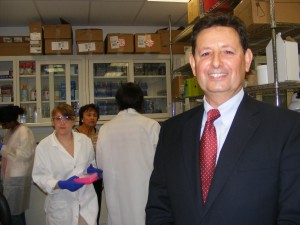
From the half-a-million-square-foot Regeneron campus to the 2,000-square-foot research lab of TechnoVax Inc. at The Landmark at Eastview, the business of biotech knows no one set size or scope.
The common denominator?
The prohibitive cost and time of the research and development process.
Jose Galarza, president and founder of the nascent TechnoVax, a maker of virus-like particle technology (VLP), said the company retained a $3 million Small Business Innovation Research (SBIR) grant in 2009 and $1 million in funding from the National Institutes of Health in 2005; the money will go toward clinical trials for mass-market vaccines for infectious diseases.
“It”™s important to educate the general public on the benefits of vaccines,” said Galarza, former principal scientist for Wyeth Pharmaceuticals in Pearl River. “Many people oppose it, but what was our standard of living 100 years ago when we didn”™t have a standardized, systematic method of prevention?”
In the vaccine business, product demand weathers a bell curve.
It”™s an industry that flies under the radar “until you have a flu scare” and in the case of “small pox and polio, many vaccines have been eliminated.”
In a way, “it”™s the most cost-effective intervention in the health care system because it”™s about prevention instead of acting once something happens.”
TechnoVax employs only nine, but plans to build on its current footprint, much like Acorda Therapeutics in Hawthorne, a biotech company that develops drugs to treat neurological disorders.
Acorda raised $600 million over a 15-year period to bring to market the new drug Ampyra, which improves mobility in those with multiple sclerosis.
“It is critical that the government continue to invest in this space, whether it”™s payroll tax easements, streamlining regulatory burdens or other ways of helping businesses like mine make it through these very expensive, high-risk development programs, understanding that in the end, it”™s an investment that benefits all of us,” said Ron Cohen, Acorda”™s CEO.
Cohen said the company”™s growth fueled the $35 million, 15-year lease it just signed for new company headquarters at Ardsley Park life science campus in the town of Greenburgh, with a move scheduled for 2012.
“We came in here with six people in 1998 and now we have over 325 people in the company,” Cohen said. “It wouldn”™t have happened without a collaboration between us, the governor”™s office, the legislature, local government ”¦ to help us invest in this area and build hopefully a lot more high-paying, important jobs.”
At a recent news conference at The Landmark at Eastview, U.S. Rep. Nita Lowey, D-Harrison, a senior member of the Congressional subcommittee for Labor, Health and Human Services, said she will continue to fight hard for “an increase in resources for the National Institutes of Health.”
Last year, biomedical researchers in the Hudson Valley region received more than $34 million in NIH grants, Lowey said.
“That investment creates good, high-paying jobs that can lead to medical advancements that benefit all of our families and reduce health care costs.”
Lowey called on Congress to extend federal tax easements, such as the reduction in employee payroll taxes in The Tax Relief, Unemployment Insurance Reauthorization and Job Creation Act of 2010, into 2012.
“I”™m asking Congress to expand it to payroll taxes paid by employers, making it easier for TechnoVax or Acorda and other Hudson Valley businesses to hire new employees.”


















